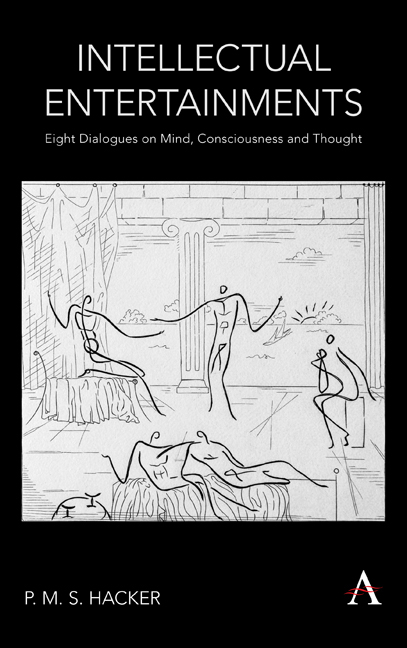Book contents
- Frontmatter
- Dedication
- Contents
- Preface
- Acknowledgements
- Section 1 Two Dialogues on Mind and Body
- Section 2 Two Dialogues on Consciousness
- Section 3 A Dialogue on the Objectivity or Subjectivity of Perceptual Qualities
- Section 4 Two Dialogues on Thought
- Introduction
- Sixth Dialogue Thought
- Seventh Dialogue Thought and Language
- Section 5 A Dialogue on Ownership of Pain
Seventh Dialogue - Thought and Language
from Section 4 - Two Dialogues on Thought
Published online by Cambridge University Press: 06 December 2019
- Frontmatter
- Dedication
- Contents
- Preface
- Acknowledgements
- Section 1 Two Dialogues on Mind and Body
- Section 2 Two Dialogues on Consciousness
- Section 3 A Dialogue on the Objectivity or Subjectivity of Perceptual Qualities
- Section 4 Two Dialogues on Thought
- Introduction
- Sixth Dialogue Thought
- Seventh Dialogue Thought and Language
- Section 5 A Dialogue on Ownership of Pain
Summary
Protagonists:
Socrates: gravelly voice, slight regional accent. Dressed in ancient Greek manner. (It should be noted that Socrates has spent a great deal of time talking with his friend Wittgenstein.)
Paul: a middle-aged Oxford don of the 1950s, dressed in well-cut sports jacket, waistcoat and tie, Oxford English accent.
Alan: a Scottish post-doc, tweed jacket and woollen tie, soft Scots accent.
Frank: a contemporary American neuroscientist in his forties, casually dressed, American accent.
John Locke: in seventeenth-century scholar's garb. A pedantic and slightly reedy voice.
The scene is a garden in Elysium in the late evening. The moon is bright. A rich verdant lawn is surrounded by flower beds and rose bushes in bloom, with tall trees behind. Beyond, there is a moonlit view of lake and mountains. There are five garden chairs around a low table on which there are some scattered books. There are candles in two large candelabras on the table, and lanterns behind the chairs. The noise of laughter and animated discussion is audible as the participants return from dinner. They take their seats.
Socrates: I must say, they do one proud at the Ambrosian. That was an excellent dinner. Now, where were we?
Paul: Well, you showed us something none of us really expected, Socrates, namely that thinking is not an activity – just like a physical activity, only mental. I must admit that I had not anticipated that.
Alan: Ay. It goes against one's intuitions.
Socrates: [chuckles] Since one's intuitions are just one's ill-informed and unreflective hunches and guesses, that shouldn't worry us.
Alan: Ay, but it's damned painful to have one's ideas pulled up by the roots.
Socrates: Well, my boy, the pain is a small price to pay for getting rid of the weeds. [He laughs]
Paul: You showed us that the relation of thinking to time is altogether unlike the relation of a physical activity to time – that in an important sense it is misleading to construe thinking as an activity. And you showed us how misleading is the idea that thinking is something ‘inner’ and private to the thinker, and how misguided the notion of introspection is when construed as apperception – as ‘inner sense’.
- Type
- Chapter
- Information
- Intellectual EntertainmentsEight Dialogues on Mind, Consciousness and Thought, pp. 177 - 200Publisher: Anthem PressPrint publication year: 2019



